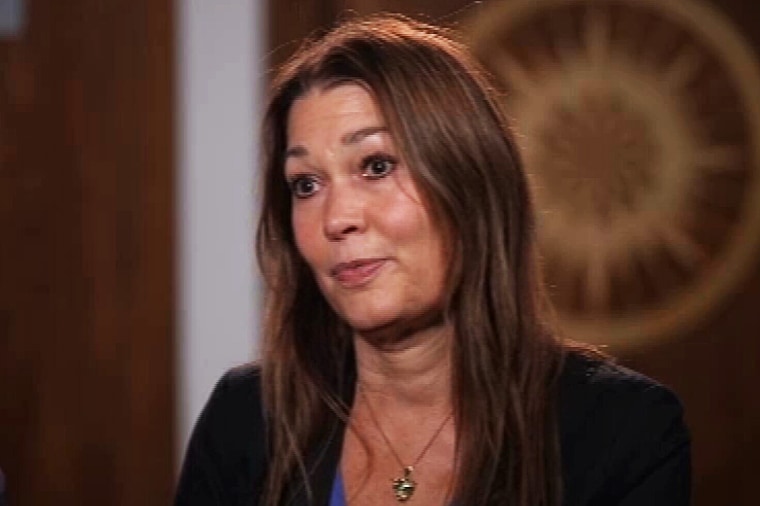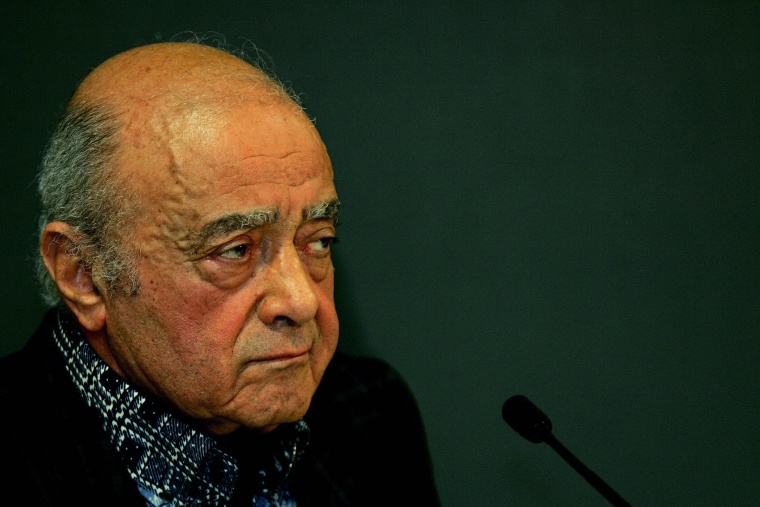LONDON – Mohammed Al Fayed would tell his female staff to call him “Papa.”
Some 37 women are now accusing the Egyptian billionaire of sexual assault and in some cases rape, including six Americans and one woman who gave an exclusive U.S. media interview to NBC News. Al Fayed, the former owner of London’s luxury department store Harrods who was featured prominently in Netflix series “The Crown,” died in 2023 at the age of 94.
But the women — many of whom appeared at a news conference in the British capital Friday, where lawyer Gloria Allred described what she said was the “systematic trafficking of women for sexual gratification” — have spoken out this week as part of a BBC documentary and podcast investigation, “Al Fayed: Predator at Harrods.” The British public broadcaster’s reporting includes allegations from numerous Harrods staffers, five of whom say they were raped by Al Fayed.
The store said it was “utterly appalled” by the allegations against its former owner.He would say, “come to Papa, I’ll protect you,” recalls Sophia Stone, who worked as Al Fayed’s personal assistant from 1988 to 1991.
Stone sat down with NBC News on Thursday, just a few blocks away from her former workplace. In a lengthy interview, Stone alleged that during the time she was employed at Harrods, Al Fayed subjected her to unwanted physical contact, and alleged he sexually assaulted and attempted to rape her on multiple occasions. She says she previously reached a settlement with Harrods but has now joined the lawsuit against the luxury store. The details of that settlement and whether that could preclude her from entering into this lawsuit were not immediately clear.
One of the attorney’s representing the women, Maria Mulla, said the lawyers are “still investigating the circumstances under which those [settlements] were reached.”
Stone said her dream was to work in fashion and, like many women, she felt she won the lottery when she got her foot in the door at Harrods as part of its training program at age 19. But her goal to work as a buyer for what was then the most prestigious department store in the world was quickly derailed by Al Fayed, she said, when he hand-selected her to become his personal assistant. What she first saw as a career opportunity turned into a nightmare that haunts her until this day.
The first red flag Stone recalls while working for Al Fayed was him giving her a tight hug.

“I was a bit like, Ooh, you know, that’s weird, but maybe that’s his culture, I don’t know,” Stone said. But then, she said, the unsolicited physical contact continued to escalate.
“He’d just be grabbing you, grabbing your boobs, putting his hand up my skirt,” she said.
The first time she alleges Al Fayed tried to rape her was at his residence in London. Stone struggled to hold back tears as she told the story.
“I was sitting on the sofa, and he came across the room and sat. He then forced himself on me. He’s quite a big man. He was quite tall. I was convinced he was going to rape me. And I was, like, started screaming, just like, I went crazy, kicking him off. Get off. Get off. Get off. Kicked him and and yeah, and he sort of fell back and just was like, Ha, Ha ha laughing, like making a joke out of it, like it was a bit of fun for him, and I was just terrified,” Stone said.
She said the attempted rapes that followed were worse, and took place at Al Fayed’s various properties.
“There were attempts in Paris, in Scotland,” she said. “I was a guest at the Bois de Boulogne, so I had my own room. And he came into the room at night when I was already in bed, you know. There were no locks. He came into the room, got into bed with me. He was wearing his horrible, little dressing gown, smoking jacket-style thing. And, you know, he’d get into bed and he tried to rape me,” she recalled.

This is not the first time allegations have been levied against Al Fayed. In 1995, a Vanity Fair article reporting that the allegations included racial discrimination, bugging employees phones and enforcing HIV testing, sparked a libel lawsuit by Al Fayed that he dropped two years later. Britain’s Channel 4 broadcast allegations of sexual assault in 2017 and 2018. Al Fayed had already sold Harrods at the time Channel 4’s broadcasts aired. But, the BBC says, many of Al Fayed’s accusers were only comfortable coming out now, following his death last year.
Harrods is now owned by Qatar’s sovereign wealth fund. In a statement, the store said in part, “We are utterly appalled by the allegations of abuse perpetrated by Mohamed Al Fayed. These were the actions of an individual who was intent on abusing his power wherever he operated and we condemn them in the strongest terms. We also acknowledge that during this time as a business we failed our employees who were his victims and for this we sincerely apologise… since new information came to light in 2023 about historic allegations of sexual abuse by Al Fayed, it has been our priority to settle claims in the quickest way possible, avoiding lengthy legal proceedings for the women involved. This process is still available for any current or former Harrods employees.”
Stone said that Al Fayed preferred blonds and would give his female staff money to dress in a certain way. “More traditional, sort of, kind of like an English rose,” she explained.
Al Fayed was often described in the British media as obsessed with British aristocracy, and, as Stone recalled, he was also obsessed with Princess Diana. “He was sending her notes, always sending her little gifts, always sending things,” she said.
Al Fayed’s connection to the royal family eventually became much closer, but reached a tragic end. His son, Dodi, was in a romantic relationship with Princess Diana in 1997, and was killed with her in the car crash in Paris that year. A fictionalized version of their relationship was depicted in the Netflix series last year, and included a warm and sympathetic portrayal of Al Fayed. NBC News has reached out to Netflix for comment.
All the while, Al Fayed was at the center of what Stone, her husband and their lawyers believe could be one of the biggest corporate sexual abuse scandals in the world. A team of U.K.-based lawyers were joined by Allred in London on Friday to announce the details of the legal claim being brought against Harrods. Many of the 37 victims have since moved out of the U.K. and some now live in the U.S.
Attorney Maria Mulla said there’s a lot to go through and that lawsuits have not yet been filed. She noted the complexity of the case and various victims, adding that there were “potential jurisdiction elements that need to be considered.”
Among the allegations outlined by the lawyers was that women who worked directly for Al Fayed, a known germaphobe, underwent invasive medical exams to test them for sexually transmitted diseases with the results only sent to Al Fayed, not the employees themselves.
“The allegations against Mohamed Al Fayed include serial rape, attempted rape, sexual battery, sexual abuse of minors. They involve doctors administering invasive gynecological exams as a condition of employment for some of the employees,” said Allred, outlining what she said was “cover ups, threats and a quarter century of sexual abuse.” She told NBC News that she was not legally representing the American accusers but was “supporting” them and consulting for the British attorneys.
Stone said she did not have to take a medical exam but knew others had.
“I didn’t have to. And I always thought that was very strange, because I felt like I knew that all the other girls had taken the test. And I don’t know why I didn’t have to take one.” she said.
Stone described a culture of secrecy and suspicion at Harrods, and said she witnessed security personnel bugging employee’s phones — the store’s former deputy director of security, Eamon Coyle, told the BBC that part of his job was listening to recorded phone calls.
Stone said she was too scared to discuss her assault with co-workers or leave her job.
Discussing why she didn’t report the abuse to anyone at Harrods, she said, “Mohamed was HR.”
“I was terrified. He had so much control. He had so much power,” said Stone. “I also had, you know, I had to live. I had to pay rent. I had to survive. I was on my own. I didn’t feel like I could talk to anyone about this. I was going through this sort of hell.”
Stone struggled to explain the hold Al Fayed had on her and other female staffers. She described him as a sort of fatherly figure who vowed to protect them, but “he kind of brainwashed me to start with,” she went on to say. “I felt like I had this – I hated him, but I also thought he was like …” Stone then broke down in tears.
“But I sort of cared for him too,” she said. “So mixed up.”
“Betrayed,” added her husband Keaton Stone, a documentary producer who has spent years trying to build a case against the former Harrods’ owner. He did not participate in the BBC investigation as a part of his documentary work. His involvement in this case is in a personal capacity.
“Everyone desperately wanted him to be held accountable while was alive,” he said sitting next to her and holding her hand.
Keaton Stone is now determined to see history rewritten. “So the world knows who this monster really was, not this sympathetic portrayal in ‘The Crown,’ this eccentric, cheeky, chappy, you know, this guy was a serial rapist.”
Sophia Stone confirmed she brought her allegations to Harrods in 2019 and eventually settled with the company out of court.
“Well, if you don’t take this, you’ll get nothing,” is how her husband explained how Harrods put it to them. “It was a paltry amount,” he added.
The attorneys representing the accusers said Friday that in the hours following the news conference, they have already had more than 200 people reach out to them with additional allegations. Those claims still need to be vetted.

